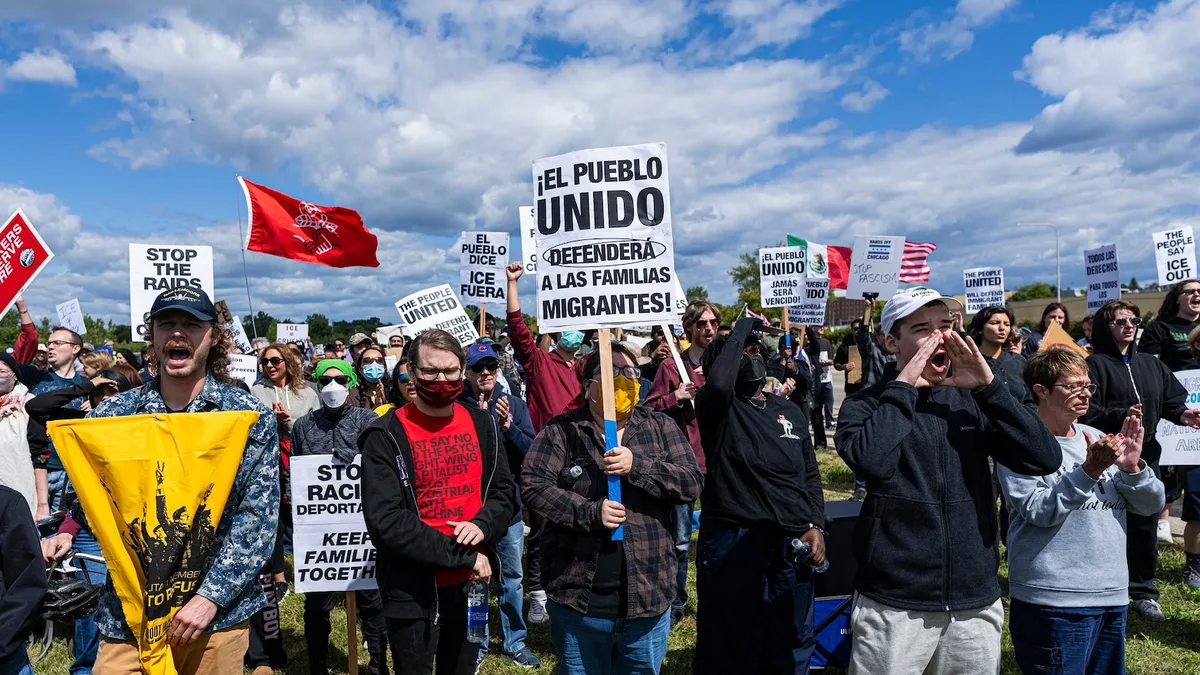
The Chicago area is currently preparing for heightened immigration enforcement over the weekend, as tensions rise between local leaders and former President Donald Trump. Illinois Governor JB Pritzker and Chicago Mayor Brandon Johnson have openly criticized Trump following his recent threats to deploy federal troops to the city, which he shared via a social media meme.
In a provocative social media post, Trump reshared an image that suggested he was ready to take action against Chicago, referencing his controversial rebranding of the Pentagon as the Department of War. Governor Pritzker condemned Trump's actions, stating that the president's posts amounted to a declaration of war against the city. "This is not normal. Donald Trump isn't a strongman; he's a scared man. Illinois won’t be intimidated by a wannabe dictator," Pritzker expressed in a post on platform X.
Mayor Johnson echoed these sentiments, asserting that the president's threats undermine the integrity of the nation. "We must defend our democracy from this authoritarianism by protecting each other and protecting Chicago from Donald Trump," Johnson stated in his own X post.
The back-and-forth between Trump and the Chicago Democrats escalated further when a White House spokesperson criticized Pritzker and Johnson for their focus on Trump's social media activity instead of addressing local crime. "Local Democrat leaders are more upset about a post from the President — that tells you everything you need to know about the Democrats’ twisted priorities," Abigail Jackson, the White House spokesperson, said in a statement to ABC News.
As tensions rise, the possibility of a significant increase in ICE agents in Chicago is alarming local officials. Governor Pritzker warned that there could be as many as 300 ICE agents operating in the city this weekend, according to local reports. Gregory Jackson, Chief of Staff in North Chicago, mentioned that city officials are preparing for the influx of agents, who are expected to operate out of the Great Lakes Naval Station for approximately 30 days.
In anticipation of these enforcement actions, fencing has been erected around the federal courthouse in Chicago. The heightened enforcement has led to the postponement of El Grito Chicago, a popular festival celebrating Mexican Independence Day. "It was a painful decision, but holding El Grito Chicago at this time puts the safety of our community at stake – and that's a risk we are unwilling to take," the event organizers stated on their website.
On Saturday, a protest took place outside Naval Station Great Lakes, where community members voiced their opposition to the impending immigration crackdown. Trump has consistently targeted Chicago in discussions about sending the National Guard to major cities, following his controversial federal takeover of Washington, D.C. He has expressed a preference for cities to formally request assistance from his administration.
Governor Pritzker has made it clear that he will not be seeking Trump's help, stating, "I will not call the president, asking him to send troops to Chicago. I've made that clear already."
A spokesperson from the Department of Homeland Security (DHS) addressed the ongoing situation, emphasizing that the enforcement efforts are aimed at "the worst of the worst criminals." The spokesperson noted that many of these criminals gravitate toward sanctuary cities where local politicians allegedly protect them, thus endangering American lives. "If you come to our country illegally and break our laws, we will hunt you down, arrest you, deport you, and you will never return," the DHS spokesperson affirmed.
As the weekend approaches, the situation in Chicago remains tense, with heightened scrutiny on both local governance and federal immigration policies. The unfolding events underscore the ongoing national debate over immigration enforcement and city sovereignty.